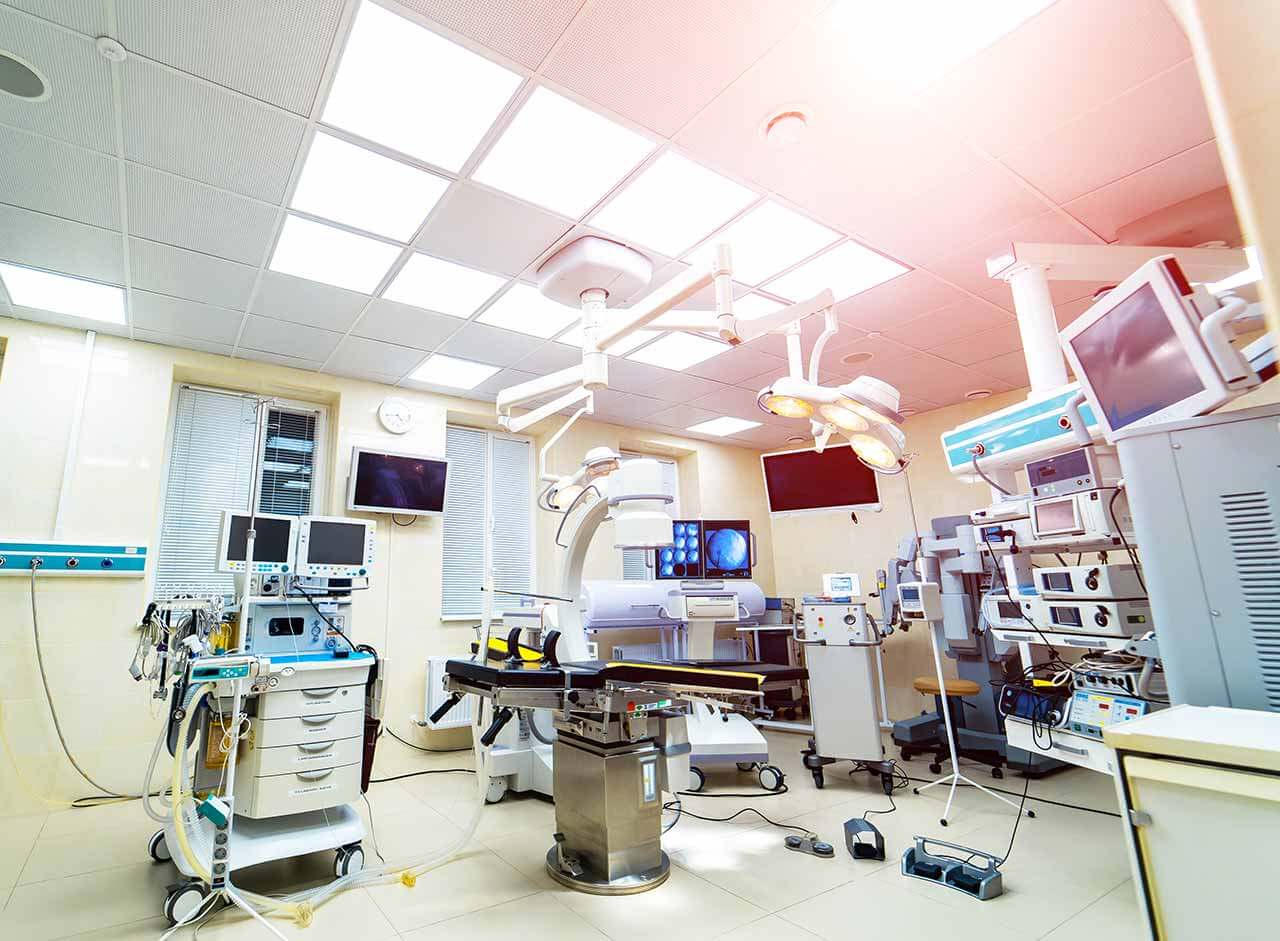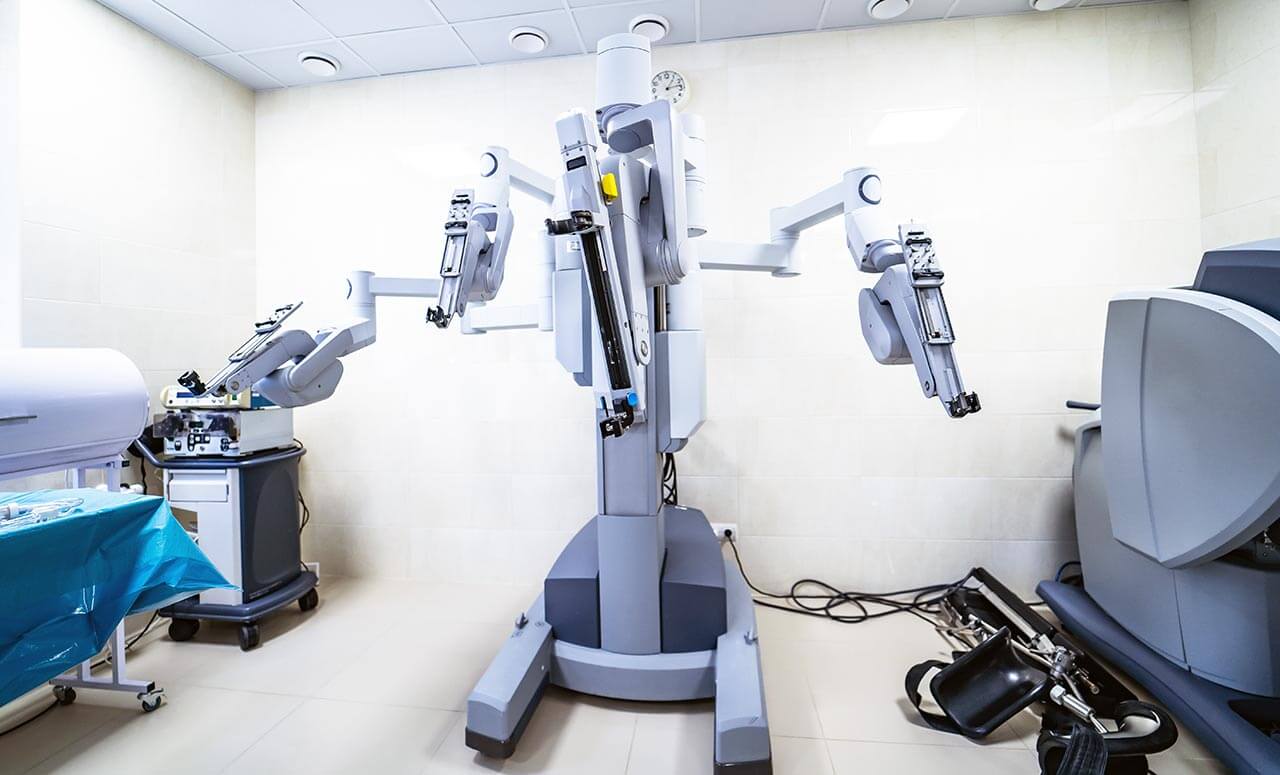
The program includes:
- Initial presentation in the clinic
- clinical history taking
- physical examination
- laboratory tests:
- complete blood count
- general urine analysis
- biochemical analysis of blood
- differential blood count
- indicators of inflammation
- indicators blood coagulation
- two blocks of induction chemotherapy
- symptomatic treatment
- blood products
- control examinations
- cost of essential medicines and materials
- nursing services
- full hospital accommodation
- explanation of future recommendations
Required documents
- Medical records
- MRI/CT scan (not older than 3 months)
- Bone marrow biopsy results (if available)
Service
You may also book:
 BookingHealth Price from:
BookingHealth Price from:
About the department
The Department of Hematology and Hematologic Oncology at the Rambam Health Care Campus Haifa offers the full service range for the diagnostics and treatment of all benign and malignant hematopoietic pathologies. The department has in its arsenal multidisciplinary laboratories and the Blood Bank, which create all the conditions for the successful implementation of comprehensive treatment of blood diseases of varying severity. The department is also the leading Israeli Leukemia Center. The department is headed by Prof. Dr. med. Tsila Zuckerman.
One of the most important focuses of the department is bone marrow transplantation (about 150 transplants annually). The transplantation is carried out within the specialized center, which has 15 beds in ultramodern patient rooms with equipment for intensive care. The specialists of the center have exceptional experience in autologous transplantation (transplantation of the patient's own bone marrow), isogenic transplantation (when the donor is the identical cosmobion of the recipient), allogeneic transplantation (when the donor is another person, for example, a relative or a family member) and haploidentical transplantation (cord blood transfusion and transplantation from a partially compatible donor). All types of transplantation are performed in accordance with the modern international protocols and meet the highest medical standards. In addition, the center provides preparations for transplantation, postoperative care and treatment of posttransplantation complications.
The department also includes the inpatient Section of Hematology, which provides chemotherapy and treatment of both malignant and benign hematological diseases, as well as the outpatient Section of Hematology, which provides consultations, chemotherapy, blood transfusions and other therapeutic procedures.
The Hematology Laboratory of the department was certified according to ISO 9001:2000 standard for its excellent quality of work. In addition, the department has an in-house Stem Cell Laboratory, which is equipped with everything necessary for the processing and cryopreservation of bone marrow and stem cell grafts, therapeutic procedures, immunophenotypic analysis and stem cell cultivation.
It is worth noting that the department's specialists are actively involved in immunological research and the development of antitumor vaccines, research of genetic specificities and treatment of leukemia, the study of the relationship between thrombosis and cancer, vascular complications during pregnancy, as well as the role of cellular organelles in human health and the development of diseases.
The department’s range of medical services includes:
- Diagnostics and treatment of hematological diseases
- Inflammatory lesions of the lymph nodes
- Pain therapy
- Antibiotic therapy
- Anti-inflammatory therapy
- Physiotherapy
- Thrombosis
- Drug therapy (Heparin, Coumadin)
- Hypercoagulation
- Thrombophilia
- Thrombocytopenia
- Corticosteroid therapy
- Surgical removal of the spleen (splenectomy) in severe immune thrombocytopenia
- Vitamin B12 and folic acid intake
- Haemophilia
- Drug therapy, for example, drug therapy of blood-coagulation factors
- Bleeding control and treatment of other manifestations of hemophilia
- Inflammatory lesions of the lymph nodes
- Diagnostics and treatment of oncohematological diseases
- Acute lymphoblastic leukemia
- Diagnostics
- Complete blood count
- Bone marrow biopsy
- Lumbar puncture (for the detection of leukemia cells in the cerebrospinal fluid)
- Therapy
- Chemotherapy in several stages (induction, consolidation, treatment and prevention of neuroleukemia, maintenance therapy)
- Bone marrow transplantation
- Diagnostics
- Acute myeloid leukemia
- Diagnostics
- Complete blood count
- Bone marrow biopsy
- Lumbar puncture (for the detection of leukemia cells in the cerebrospinal fluid)
- Additional laboratory tests
- Therapy
- Chemotherapy in several stages (induction, consolidation,maintenance therapy)
- Bone marrow transplantation
- Diagnostics
- Chronic lymphocytic leukemia
- Diagnostics
- Complete blood count
- Bone marrow biopsy
- Additional examinations (immunophenotyping, cytogenetic examination, determination of specific antibodies)
- Therapy
- Chemotherapy (intake of pills, infusion therapy)
- Corticosteroid therapy
- Monoclonal antibody therapy
- Radiation therapy
- Diagnostics
- Hodgkin's lymphoma
- Diagnostics
- Laboratory blood tests
- Chest X-ray
- Ultrasound scanning
- Computed tomography (CT)
- Bone marrow biopsy
- Positron emission tomography (PET)
- Magnetic resonance imaging (MRI)
- Therapy
- Radiation therapy
- Chemotherapy
- Diagnostics
- Non-Hodgkin lymphoma
- Aplastic anemia (the main treatment method is bone marrow transplantation)
- Fanconi anaemia
- Dyskeratosis congenita
- Diamond–Blackfan anemia
- Shwachman–Diamond syndrome
- Paroxysmal nocturnal hemoglobinuria
- Aplastic anemia (the main treatment method is bone marrow transplantation)
- Multiple myeloma
- Diagnostics
- Blood test
- Urinalysis
- Bone marrow biopsy
- Diagnostic imaging techniques (X-ray, CT, MRI and PET)
- Therapy
- Targeted therapy
- Biological therapy
- Chemotherapy
- Radiation therapy
- Corticosteroid therapy
- Bone marrow transplantation
- Therapy for myeloma complications
- Pain therapy (surgery and radiation therapy help to relieve bone pain in myeloma)
- Dialysis in impaired kidney function
- Treatment of osteoporosis by means of bisphosphonate therapy
- Influenza and pneumonia vaccination
- Intake of drugs to increase the levels of erythrocytes in anemia
- Diagnostics
- Acute lymphoblastic leukemia
- Other diseases, other diagnostic and treatment methods
Curriculum vitae
Prof. Tsila Zuckerman is the Chief Physician of the Department of Hematology and Hematologic Oncology at the Rambam Health Care Campus Haifa and Clinical Associate Professor at the Ruth and Bruce Rappaport Faculty of Medicine of the Technion (Israel Institute of Technology). Her teaching activities include coordination of the course on hematologic oncology for medical students, instruction of the Capsule course and consultation of clinical-year students. Dr. Zuckerman also heads the Leukemia Research Laboratory at the Clinical Research Institute at Rambam (CRIR) and mentors PhD and MSc students.
Prof. Zuckerman received her doctoral degree (with honors) from the Faculty of Medicine at the Technion in Haifa, Israel. She had her residency in Internal Medicine at the Carmel Medical Center in Haifa. She went on to complete a three-year clinical and research fellowship in Hematologic Oncology and Bone Marrow Transplantation at the University of Southern California (Los Angeles, CA, USA). Upon her return to Israel, Dr. Zuckerman joined the Department of Hematology and Hematologic Oncology at the Rambam Health Care Campus Haifa. Since 2006, she has been heading the Bone Marrow Transplantation Unit, where over 2,500 transplants have been performed to date.
Dr. Zuckerman also serves as coordinator of the Integrative Course in Hematologic Oncology at the Faculty of Medicine of the Technion. She is a co-author of about 20 scientific articles published in the leading international journals in the field of hematology. She is also a presenter at major national and international meetings. Her main research interests are the correlation between hepatitis C virus and development of lymphoma, complications of bone marrow transplantation, including veno-occlusive disease and infections, as well as minimal residual diseases in leukemia patients.
Photo of the doctor: (c) Rambam Health Care Campus Haifa
About hospital
The Rambam Health Care Campus Haifa is the largest and the most progressive hospital in Northern Israel. The medical center was founded in 1938 and nowadays is proud of its long history, rich and successful experience in providing comprehensive medical services in all medical fields. The hospital serves more than 2 million locals, as well as the members of the Israel Defense Forces, UN Peacekeeping Forces and the United States Sixth Fleet. The medical center houses 61 inpatient departments, 73 specialized departments, 10 medical institutes and 25 laboratories. It is also the clinical and academic base of the Technion – Israel Institute of Technology.
The medical center includes the Ruth Rappaport Children's Hospital. It is a multidisciplinary medical facility specializing in the diagnostics and treatment of various pathologies, including extremely rare ones, in children of all age groups.
The total number of employees in the medical facility is 4,000 (715 doctors and 1,407 nurses). Many doctors are world-famous in the field of their clinical specialty and participate in advanced research projects in order to offer new treatment methods not only to their patients, but also to the world community.
The medical center is a leader in the field of medical care in emergency cases with a large number of victims. In addition, the hospital is certified in accordance with the strict standards of the Joint Commission International (JCI).
During the long-term and successful clinical practice, the medical center has formed a clear vision of optimal medical support and system of values. These suggest that the primary focus is always on the patient with his individual needs and wishes, while the medical services are professional, high-quality and safe. In addition, the specialists of the hospital apply the most effective and innovative treatment methods, as well as create a favorable environment, which contributes to the improvement of physical and emotional health and well-being of the patient. The key role in the daily work of the hospital is also played by a tolerant attitude towards all patients.
Photo: (c) depositphotos
Accommodation in hospital
Patients rooms
The patients of the Rambam Health Care Campus Haifa live in comfortable rooms designed in light colors. The standard room includes an automatically adjustable bed, a bedside table, a wardrobe for storing clothes, an armchair and chairs for receiving visitors, a TV, a telephone. Each room is equipped with an ensuite bathroom with shower and toilet.
Meals and Menus
The patients of the hospital are offered tasty and balanced three meals a day: breakfast, lunch and dinner. The menu also includes dietary and vegetarian dishes.
Further details
Standard rooms include:





